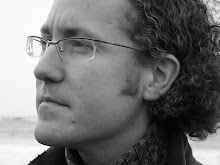So here it is: the first post to my blog chronicling my research on the perceptual foundations of continuity editing.
The what? (I hear you call).
Well I've decided to start writing this blog because I'm meant to be writing a thesis, and this provides a good distraction.... No seriously (mostly), I'm writing it because, as with all webpages, I built mine over a year ago with the intention to continually update it with details of my Ph.D. research but once it was semi-complete there doesn't seem any reason to tinker with it. As such it has laid in a rather stagnant state which means it is of only temporary use to anybody who is interested in this area of research. I believe one of the main reasons why more people haven't been working in this research area is that there is no "way-in" for the casually interested academic/student/member of the public. During my travels to conferences and my e-mail correspondences I have spoken to a lot of people from many different areas of academia who are asking the same questions but don't know how to answer them. Hopefully, this blog and the associated webpages will provide some insight into the way I have attempted to answer some of these questions. It is not intended to be a definitive guide to this area but by outlining my ideas, references, and methodologies I hope to point interested researchers in the right direction.
But wait! What questions?
Well, the topic of my Ph.D. thesis is the empirical investigation of the cognitive processes involved in film viewing. My specific aim is to use empirical methods to investigate how the natural processes involved in visual perception can be used to validate the conventions used by film editors. When editing a film, a film editor constantly has to make decisions about how and when to cut between shots. These decisions function on many levels. Does the cut drive the narrative of the scene? Does it induce the right emotion in the viewer? Does the action flow smoothly across the cut? To simplify the editor’s task conventions exist that allow the editor to quickly arrange a “rough” sequence of shots which can then be tweaked for stylistic or affective reasons. These conventions, referred to as the rules of continuity editing, can be found in any film theory text book and are taught to film students the world over. Yet, the reason why the conventions exist is not really known. Editors will take a stab at explaining the benefit of one composition resulting from the application of a convention over one which violates a convention but their explanation is only built on introspection and hearsay. As with all artists, an editor’s craft is one of feeling and intuition and as such it is not their job to express the conceptual steps they take whilst creating their art. This task is better suited to somebody who can approach the problem objectively and utilise methodologies that allow the problem to be dissected via the testing of specific hypotheses. By applying empirical methods to the task of understanding the cognitive processes involved in film viewing we can begin to understand the moment-by-moment behaviour of film viewers. This allows us to better understand how the decisions made by an editor affect the resulting experience of the film viewer and, in turn, validate the conventions or continuity editing.
So that is a brief introduction to the research area that will be the subject of this blog. More information on my specific methodologies, experiments, and theories can be found on the rest of this website. As for the future of this blog, well my intention is to use it primarily to discuss my ideas as they develop over the course of writing my thesis. I probably take the occasional detour into related themes (e.g. topical discussion of films) as well as any references, interesting websites, books, etc that crop up. But for now I’ll think I’ll leave it there. Please feel free to comment on any of my posts and contact me if you have any requests for information/facilities I should provide on this website.
All the best.
Tim J. Smith (aka Continuity Boy)




1 comment:
Tim, I find it all fascinating. My son is an NYU cinema studies grad and also, as it turns out, Ben Folds' most recent drummer. I am retired now...but worked on two fronts in the arts and in psychology. I will have to study your site more in order to ask an intelligent question. I am also finding your links interesting. I found you in random searching of blog sites. My site is lifesbone.blogspot.com Mostly I play with language. Dan
Post a Comment